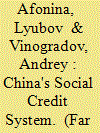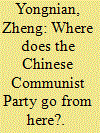|
|
|
Sort Order |
|
|
|
Items / Page
|
|
|
|
|
|
|
| Srl | Item |
| 1 |
ID:
192512


|
|
|
|
|
| Summary/Abstract |
China's nationwide social credit system (also called social rating system) aims to collect and analyze data on companies and individuals to assess their economic and social influence, civic qualities, responsibility, and financial reliability. The digital deterrence system for regulating public life appears to be a continuation of the Chinese social experiments of the second half of the 20th century. This time, however, social engineering uses previously unknown technical means free from the disadvantages of subjective evaluation and application under set parameters. Digitalization has thus provided another tool for assessing social behavior - an additional control system based on strict mathematical principles and, importantly, unlike legal systems, operating in real time. In terms of its regulatory function, it is comparable to ethnical norms and morality.
|
|
|
|
|
|
|
|
|
|
|
|
|
|
|
|
| 2 |
ID:
114589


|
|
|
|
|
| Publication |
2012.
|
| Summary/Abstract |
The predicament of political reform that China faces today is that while people are increasingly aware of its importance, they lack a basic consensus on what to reform and how. This article argues that political reform cannot be achieved by utopianism but must be based on Chinese political practice. The practice in Chinese politics in the era of reform and opening demonstrates that political reform has three main dimensions, namely, open party, meritocratic competition and public participation. First, the ruling party, the Chinese Communist Party (CPC), tends to become increasingly open, which is leading to an open political system. Second, an open political system is gradually leading to limited political competition among political elites, based on the traditional notion of meritocracy. And third, with political competition, social participation is gradually being materialised. Overall, openness, competition and participation are the essential characteristics of the so-called Chinese political model. This article also argues that while China's political system is developing these characteristics, there are enormous challenges ahead for the realisation of these political values. But, if the intra-Party democracy cannot be substantiated, the future of the CPC is uncertain.
|
|
|
|
|
|
|
|
|
|
|
|
|
|
|
|
|
|
|
|
|